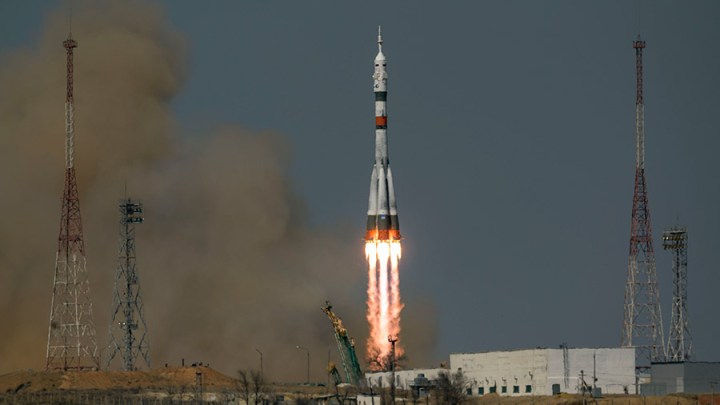
Three new astronauts arrived at the International Space Station (ISS) yesterday, Friday, April 9, and it’ll be a tight squeeze for a few days as that brings the current crew of the station to 10.
The new astronauts arrived on a Russian Soyuz spacecraft that departed from Kazakhstan, on a flight taking approximately three hours. The craft docked with the station at 7:05 a.m. ET and the hatch was opened at 9:20 a.m. ET to allow them to pass into the station.
The ISS typically has a crew of three to six members any one time, with crews overlapping in what is referred to as Expeditions. Expedition 63, for example, ran from April to October last year and consisted of between three and six people. The current Expedition 64 includes three people who were members of that previous group, plus four new crew members who arrived on the SpaceX Crew Dragon in its second operational flight in April this year.
With the arrival of the three newest crew members, that brings the total of astronauts on the station to 10. These include five NASA astronauts (Kate Rubins, Michael Hopkins, Victor Glover, Shannon Walker, and Mark Vande), four Russian cosmonauts (Sergey Ryzhikov, Sergey Kud-Sverchkov, Oleg Novitsky, Pyotr Dubrov), and the Japanese Space Agency JAXA’s Soichi Noguchi.
These crew members also came on three different spacecraft, with some coming aboard a Space X Crew Dragon, and others coming on one of two Russian craft: The Soyuz MS-17 and the Soyuz MS-18.

Even though 10 is a much larger crew than is typical for the ISS, it isn’t the largest crew ever to stay on the station. That award goes to a crew of 13 who assembled on the ISS in 2009. And the current tightly-packed crew will be able to spread themselves out more soon, as Expedition 64 is about to come to an end.
On April 16, Rubins, Ryzhikov, and Kud-Sverchkov will depart the space station, and the remaining seven crew members will form Expedition 65. Shannon Walker will take over as commander of the station for this expedition.
Editors' Recommendations
- Junk from the ISS fell on a house in the U.S., NASA confirms
- How to watch three crew members launch to the ISS on Thursday
- Amazing Earth photos shared by outgoing ISS astronaut
- Crew-8 launches with small crack in capsule, but SpaceX says it’s safe
- SpaceX’s Crew-8 head to launchpad for ride to space




